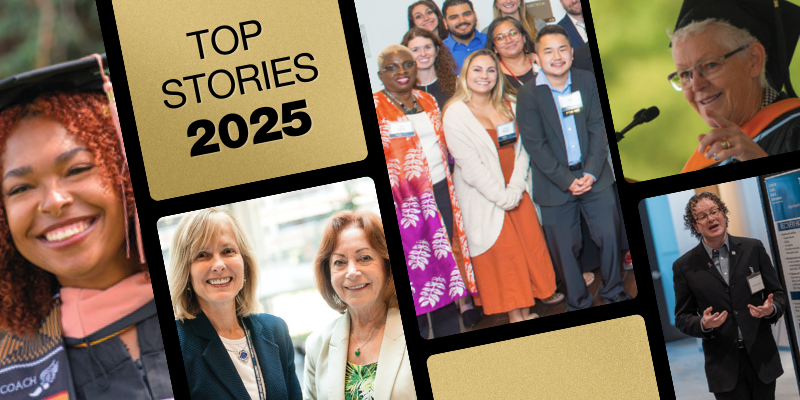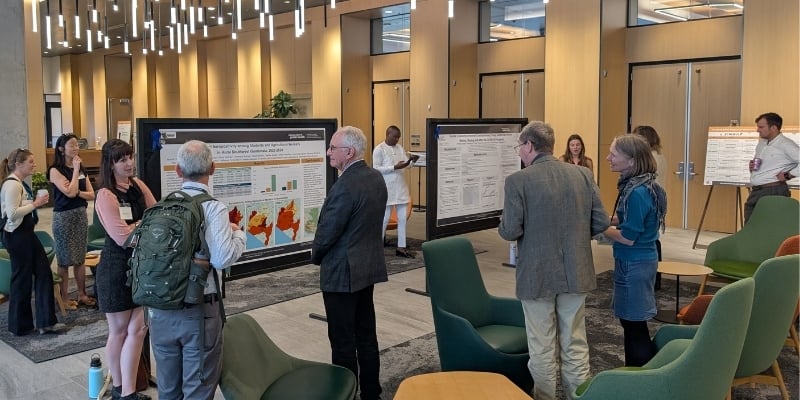The many challenges and opportunities for improving health and safety for workers were in the spotlight April 4 at the 2024 Research Day Symposium, sponsored by the Center for Health, Work & Environment (CHWE) in the Department of Environmental & Occupational Health at the Colorado School of Public Health.
The day-long gathering filled a large ballroom at the DoubleTree by Hilton hotel in northeast Denver, just across Quebec Street from the site of the old Stapleton Airport, which closed in 1995. Nearly 30 years later, scores of students and faculty from ColoradoSPH at the University of Colorado Anschutz Medical Campus and Colorado State University, as well external advisors, international guests and other attendees, had their eyes fixed firmly on the future. “This symposium is a chance to showcase all we do,” said Lee Newman, MD, MA, Distinguished Professor at ColoradoSPH.
Newman directs the CHWE, which is a leader in researching and developing solutions that meet its mission to “advance worker safety, health and well-being.” Newman introduced ColoradoSPH Dean Cathy Bradley, PhD, who noted that as a health and labor economist, the symposium’s attention to the importance of worker health “is an area of true interest to me.”
Specifically, Bradley explained that her research has long focused on the twin impacts of work on health and of health on work – specifically among employees with cancer. That includes her most recent study, funded by the National Institutes of Health and the National Cancer Institute, that examines the effects of cancer care on the well-being of low-income workers.
Posters and platforms for a broad range of concerns
The symposium “showcase” Newman mentioned featured platform and poster presentations by 34 authors – many of them ColoradoSPH students – who described their research in detail. For example, the work of 27 poster presentation authors covered seven broad areas that influence the safety and well-being of workers:
- Climate change
- Ergonomics and safety
- Health physics
- Industrial hygiene
- Occupational and environmental medicine
- Occupational health psychology
- Total worker health
A number of poster presenters detailed their research into the health threats workers face across the globe. In Colorado, the challenges include inhalation of air-borne toxins from wildfires and potentially crippling stoop labor and unprotected sun exposure among crop workers. In Guatemala and Vietnam, rising temperatures impose increasing risks of heat strain and injury to sugar cane cutters and other agricultural workers, especially with growing demands for productivity.
The breadth of the poster presentation research covered more than geography. For example, other work addressed concerns for the health and well-being of workers in stressful, low-paying jobs in nursing homes and early childhood education centers, as well as the need to ensure protections for employees with chronic conditions like diabetes and cardiovascular disease.
The seven platform presentations also covered a broad gamut of issues across the globe. For example, the research included an investigation of methods for removing radioactive cesium from water – a challenge still faced in Japan, more than a decade after a devastating tsunami swamped the Fukushima Nuclear Power Plant.
Another presentation examined efforts to pinpoint the role, if any, of air particulates in high rates of chronic kidney disease among sugar cane cutters in Latin America. Additional efforts, among others, looked at methods for measuring worker well-being among agricultural workers in the San Luis Valley and neurocognitive risks to workers from ionizing radiation.
Keynote address from an international perspective
The symposium’s keynote address by Rebeca Velasco Reyna, MD, National Coordinator of Occupational Health at the Mexican Institute for Social Security (Instituto Mexicano del Seguro Social, or IMSS) highlighted the international reach of workers’ health issues. Reyna presented the work of Mexico’s Safe and Healthy Work Environments program (Entornos Laborales Seguros y Saludables, or ELLSA).
ELSSA, a voluntary program, works with employers on developing strategies and programs that improve worker health, well-being and productivity while preventing psychosocial and ergonomic risks, chronic diseases, accidents and work-related illnesses, Reyna explained. She then presented details of the organization’s work and track record of success in meeting these goals. Newman noted that he met Reyna during a trip to Mexico with then-ColoradoSPH Dean Jonathan Samet, MD, MS, who was in attendance. Samet is now interim director of the Department of Environmental & Occupational Health.
The trip identified CHWE and IMSS identify opportunities to collaborate on issues affecting worker health and safety on both sides of the border, Newman said. He recalled Reyna telling him, “We have to find a way to work together because we have so many aligned interests.” That cooperation has happened, Newman said, crediting Samet for creating the cross-border relationship.
Bradley summed up the sweep of the symposium’s reach by noting both the importance of individual research efforts and the need to find solutions that improve public health broadly.
“Every single one of us wants to save the entire world, and that’s why we go into this field,” Bradley told the audience. “But we must find change at the population level and change the environments in which people live so we can make permanent change for everyone.”
Click here for a full list of the authors and abstracts presented at the Research Day Symposium.






